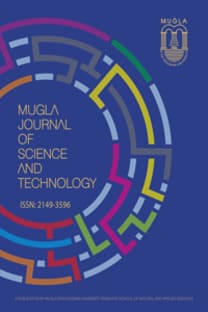MAKİNELERİN ÖĞRENENDEN KARAR VERİCİYE DÖNÜŞÜMLERİ: ENDÜSTRİ 4.0 VE BÜYÜK VERİ
Endüstri 4.0, Akıllı Fabrikalar, Büyük Veri Analitikleri
TRANSFORMATION OF THE MACHINES FROM LEARNER TO DECISION MAKER: INDUSTRY 4.0 AND BIG DATA
Industry 4.0, Smart Factory,
___
- [1] Drath, R., & Horch, A., "Industrie 4.0: Hit or Hype?", IEEE Industrial Electronics Magazine 8(2), 56-59, 2014.
- [2] Höller, J., Tsiatsis, V., Mulligan, C., Karnouskos, S., Avesand, S., & Boyle, D. "Machine-to-Machine to the Internet of Things: Introduction to a New Age of Intelligence", Elsevier Publishing, e-ISBN: 9780080994017 , 1-352, 2014.
- [3]Buhr, D., "Social Innovation Policy for Industry 4.0", Friedrich Ebert Stiftung, 3-16, 2015.
- [4] Bauer, W., “Industry 4.0- An Economy Based on The Internet of Things”, 23rd International Conference for Production Research, Manila, Philippines, 2015.http://www.piie.org/icpr23/downloads/04%20Bauer.pdf
- [5] Zug, S., Wilske, S., Steup, C., & Lüder, A., "Online Evaluation Of Manipulation Tasks For Mobile Robots İn Industry 4.0 Scenarios", IEEE 20th Conference on Emerging Technologies & Factory Automation (ETFA), Luxembourg: IEEE, 1-7, 2015.
- [6] Zhou, K., Liu, T., & Zhou, L., "Industry 4.0: Towards Future Industrial Opportunities And Challenges", 12th International Conference on Fuzzy Systems and Knowledge Discovery (FSKD), Zhangjiajie: IEEE, 2147-2152, 2015.
- [7] Niesen, T., Houy, C., Fettke, P., & Loos, P., "Towards An Integrative Big Data Analysis Framework For Data-Driven Risk Management In Industry 4.0", 49th Hawaii International Conference on System Sciences (HICSS), Koloa: IEEE, 5065-5074, 2016.
- [8] Papakostas, N., O'Connor, J., & Byrne, G., "Internet Of Things Technologies In Manufacturing: Application Areas, Challenges And Outlook, International Conference on Information Society (i-Society), IEEE, 126-131, 2016.
- [9] Caputo, A.; Marzi G.; M. M. Pellegrini, M.M., "The Internet Of Things in Manufacturing Innovation Processes. Development And Application Of A Conceptual Framework", Business Process Management Journal, 22(2), 383-402, 2016.
- [10] World Economic Forum,“The Future of Jobs”, World Economic Forum, 1-167, 2016.
- [11] Lee, J.; Kao, H. A.; Yang, S., "Service Innovation And Smart Analytics For Industry 4.0 And Big Data Environment", Procedia CIRP, 16,3–8, 2014.
- [12] Kovar, J., Mouralova, K., Ksica, F., Kroupa, J., Andrs, O., & Hadas, Z., "Virtual Reality In Context Of Industry 4.0 Proposed Projects At Brno University Of Technology", 17th International Conference on Mechatronics-Mechatronika (ME), IEEE, 1-7, 2016.
- [13] McKinsey Clobal Institute, “The Age Of Analytics: Competing in A Data-Driven World”, McKinsey Analytics, Mckinsey&Company, 2016.
- [14] Burning Glass Technologies, “The Quant Crunch- How The Demand For Data Science Skills İs Disrupting The Job Market”. https://bigdata.ieee.org/images/files/pdf/The-Quant-Crunch_Final.pdf , 2017.
- [15] GTAI, "Big Data", https://www.gtai.de/GTAI/Navigation/EN/Invest/Industries/Industrie-4-0/Internet-of-things/industrie-4-0-internet-of-things-big-data.html?view=renderPdf, 1-2, 2017.
- [16] T-Systems International GmbH., "Big Data". T-Systems: https://www.t-systems.com/en/perspectives/big-data/iot-trends/big-data-analysis-440752 , 2017.
- [17] ITRI, "Big Data Analytics for Industry 4.0 Predictive Manufacturing", ITRI- Industrial Technology Research Institute, 2017.https://www.itri.org.tw/eng/content/msgpic01/contents.aspx?&SiteID=1&MmmID=620651706136357202&CatID=620653256103620163&MSID=711022154112316330
- [18] Lee, J., Bagheri, B., & Kao, H. A., "A Cyber-Physical Systems Architecture For Industry 4.0-Based Manufacturing Systems", Manufacturing Letters, 18-23, 2015.
- [19] Wang, S., Wan, J., Zhang, D., Di, L., & Zhang, C., "Towards Smart Factory For Industry 4.0: A Self-Organized Multi-Agent System With Big Data Based Feedback And Coordination", Computer Networks, 158-168, 2016.
- [20] Tan, C., Hu, J., Chung, H., Barton, K., Piya, C., Ramani, K., & Banu, M., "Product Personalization Enabled By Assembly Architecture And Cyber Physical Systems", CIRP Annals - Manufacturing Technology, 33-36, 2017.
- [21] Liu, X. F., Shahriar, M. R., Sunny, S. L., & Hu, L., "Cyber-Physical Manufacturing Cloud: Architecture, Virtualization, Communication, And Testbed", Journal of Manufacturing Systems, 352-364, 2017.
- [22] Kusiak, A., "Smart Manufacturing Must Embrace Big Data", Nature, 23-25, 2017.
- [23] Özdemir, Ş., Erkollar, A., " Next Generation’s Industry 4.0 Journey: the Case of Management Information Systems", International Symposium for Production Research, 535-545, 2017.
- ISSN: 2149-3596
- Yayın Aralığı: 2
- Başlangıç: 2015
- Yayıncı: Muğla Sıtkı Koçman Üniversitesi Fen Bilimleri Enstitüsü
MUĞLA BÖLGESİ İÇİN SPEKTRAL GÜNEŞ IŞINIMINDAKİ MEVSİMSEL DEĞİŞİM
TÜRKİYE ELEKTRİK ENERJİSİ ÜRETİMİ VE TÜKETİMİNİN GRİ TAHMİN YÖNTEMİ İLE BELİRLENMESİ
DİRNE’NİN EVSEL KATI ATIKTAN ENERJİ ÜRETİMİ VE SERA GAZI AZALTIM POTANSİYELİ ÜZERİNE BİR ÇALIŞMA
MAHLEP PÜRESİNİN VAKUM KURUTMA KARAKTERİSTİKLERİNİN MATEMATİKSEL MODELLENMESİ
HİLAL İŞLEROĞLU, GÖKHAN GÜRLEK
IMPORTANCE OF SOME METALLOIDS IN BIOLOGICAL LIFE
MERVE SEZER, Esra DİBEK, Bekir ÇÖL
A STUDY ON ENERGY PRODUCTION AND GHG MITIGATION POTENTIAL FROM MUNICIPAL SOLID WASTE OF EDİRNE
SEASONAL VARIATION of the SPECTRAL IRRADIANCE for the PROVINCE of MUĞLA
OLAY GÜDÜMLÜ MOLEKÜLER DİNAMİĞİN SES HIZI HESABINA DAYALI SAĞLAMLIK DEĞERLENDİRMESİ
VOLKAN RAMAZAN AKKAYA, İLYAS KANDEMİR
DİKDÖRTGEN KESİTLİ KANATÇIKLARIN ISI TRANSFERİNE OLAN ETKİSİ: DERLEME MAKALESİ
